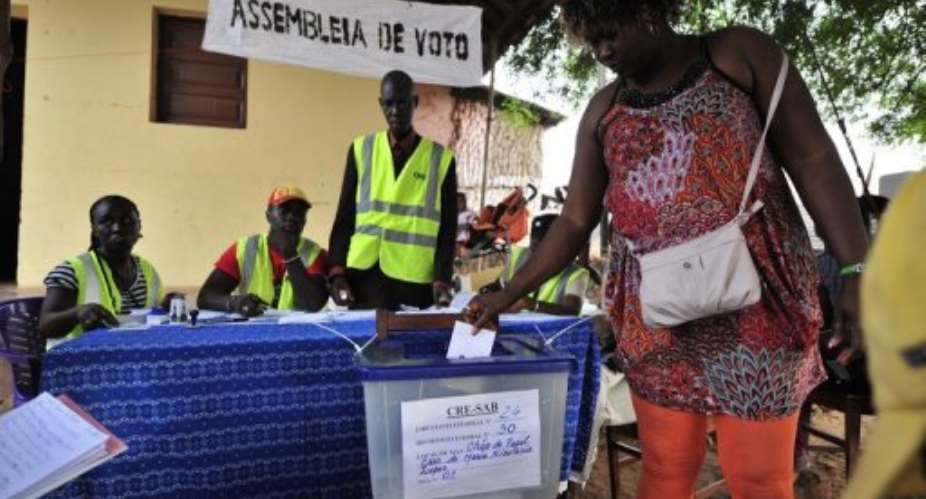BISSAU (AFP) - Guinea-Bissau began voting Sunday for a new president, an office nobody has held for a full five-year term in the west African state where chronic instability has fed a booming cocaine trade.
The election and its aftermath will provide a key test for the poor former Portuguese colony which needs to prove its stability to usher in crucial international aid for reforms to a bloated and powerful army.
"This election is very important for me and my country," said Victor Bessante, 56, as he cast his ballot in the Chao de Papel suburb of the crumbling seaside capital Bissau.
Since independence from Portugal in 1974, achieved after an 11-year armed conflict, three presidents have been overthrown by coups, and one was assassinated in office in 2009.
The army has never been downsized and has been in constant, often deadly competition with the state. Taking up about 10 percent of the national budget, the military gets more money than health or education.
Sunday's election comes after the last president Malam Bacai Sanha died in January following a long illness.
A mutiny by renegade soldiers in April 2010 prompted the European Union and the United States to suspend crucial budgetary and security sector reform support - leaving much hanging on a smooth election and post-poll reforms.
Despite a peaceful three-week election campaign, some fear violence or military intervention if the army does not approve of the winning candidate.
Nine candidates are running for office, four of whom are seen as frontrunners.
These include Carlos Gomes Junior, 62, who stepped down as prime minister to run in the election as the candidate for the ruling African Party for the Independence of Guinea and Cape Verde (APIGCV).
Vincent Foucher of the International Crisis Group based in Dakar said Gomes is seen by the international community as "the least worst" candidate. Also in the fray is former president Kumba Yala, 59, whose 2000-2003 regime was marked by instability, and who was overthrown in a coup d'etat.
Independent Henrique Rosa, 66, who was transition president in 2004-5 and scored 24 percent in the last election, is also running as is lawmaker Manuel Serifo Nhamadjo, a breakaway candidate from the ruling party.
A proponent of military reform, Gomes has been unpopular with the military and was briefly kidnapped by the current army chief during the 2010 mutiny.
Oil-rich Angola is believed to have played a powerful role in smoothing tensions in the country, and has scores of troops stationed there now - angering some in the military who feel Gomes is cultivating a personal security force, said Foucher.
The country is also working on a big bauxite mining project which could boost the economy of the impoverished nation which survives mostly off exporting cashew nuts and fishing.
A dysfunctional state, with a porous coastline and and archipelago of islands where hidden airstrips can be set up, has also provided fertile ground for Latin American drug lords looking for a hub to ship their cocaine to Europe.
The United States in 2010 labeled the country's air force and naval chiefs "drug kingpins" and the trafficking is said to involve leaders of the country's highest institutions.
Some 180 foreign observers from the Economic Community of West African States, the African Union, the Community of Portuguese-Speaking Countries, Britain, the United States, Nigeria and South Africa are to monitor the polls.
The elections commission announced Saturday that 593,000 had registered to vote, an unexplained increase from the previous figure of 579,000. Polls close at 7:00pm.





 Supreme court declares payment of wages to spouses of President, Vice President ...
Supreme court declares payment of wages to spouses of President, Vice President ...
 Publish full KPMG report on SML-GRA contract – Bright Simons to Akufo-Addo
Publish full KPMG report on SML-GRA contract – Bright Simons to Akufo-Addo
 Kumasi International Airport to begin full operations by end of June
Kumasi International Airport to begin full operations by end of June
 Election 2024: Our ‘real challenge’ is getting ‘un-bothered’ youth to vote – Abu...
Election 2024: Our ‘real challenge’ is getting ‘un-bothered’ youth to vote – Abu...
 [Full text] Findings and recommendations by KPMG on SML-GRA contract
[Full text] Findings and recommendations by KPMG on SML-GRA contract
 Renegotiate SML contract – Akufo-Addo to GRA, Finance Ministry
Renegotiate SML contract – Akufo-Addo to GRA, Finance Ministry
 J.B Danquah-Adu murder trial: Sexy Dondon to Subpoena Ken Agyapong, Ursula Owusu
J.B Danquah-Adu murder trial: Sexy Dondon to Subpoena Ken Agyapong, Ursula Owusu
 Galamsey: Five Burkinabes jailed 20 years each for mining
Galamsey: Five Burkinabes jailed 20 years each for mining
 'It's no crime' – Abu Sakara defends Alan's exit from NPP
'It's no crime' – Abu Sakara defends Alan's exit from NPP
 'We know all your houses, pay your bills now or we’ll disconnect you; we're all ...
'We know all your houses, pay your bills now or we’ll disconnect you; we're all ...
